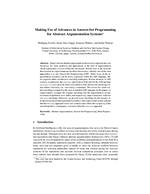Making Use of Advances in Answer-Set Programming for Abstract Argumentation Systems
Aus International Center for Computational Logic
Making Use of Advances in Answer-Set Programming for Abstract Argumentation Systems
Wolfgang DvořákWolfgang Dvořák, Sarah Alice GagglSarah Alice Gaggl, Johannes Peter WallnerJohannes Peter Wallner, Stefan WoltranStefan Woltran
Wolfgang Dvořák, Sarah Alice Gaggl, Johannes Peter Wallner, Stefan Woltran
Making Use of Advances in Answer-Set Programming for Abstract Argumentation Systems
In Hans Tompits, Salvador Abreu, Johannes Oetsch, Jörg Pührer, Dietmar Seipel, Masanobu Umeda, Armin Wolf, eds., 19th International Conference, INAP 2011, and 25th Workshop on Logic Programming, WLP 2011, Vienna, Austria, September 28-30, 2011, Revised Selected Papers, volume 7773 of Lecture Notes in Computer Science, 114-133, 2013. Springer
Making Use of Advances in Answer-Set Programming for Abstract Argumentation Systems
In Hans Tompits, Salvador Abreu, Johannes Oetsch, Jörg Pührer, Dietmar Seipel, Masanobu Umeda, Armin Wolf, eds., 19th International Conference, INAP 2011, and 25th Workshop on Logic Programming, WLP 2011, Vienna, Austria, September 28-30, 2011, Revised Selected Papers, volume 7773 of Lecture Notes in Computer Science, 114-133, 2013. Springer
- KurzfassungAbstract
Dung’s famous abstract argumentation frameworks represent the core formalism for many problems and applications in the field of argumentation which significantly evolved within the last decade. Recent work in the field has thus focused on implementations for these frameworks, whereby one of the main approaches is to use Answer-Set Programming (ASP). While some of the argumentation semantics can be nicely expressed within the ASP language, others required rather cumbersome encoding techniques. Recent advances in ASP systems, in particular, the metasp optimization front-end for the ASP-package gringo/claspD provide direct commands to filter answer sets satisfying certain subset-minimality (or -maximality) constraints. This allows for much simpler encodings compared to the ones in standard ASP language. In this paper, we experimentally compare the original encodings (for the argumentation semantics based on preferred, semi-stable, and respectively, stage extensions) with new metasp encodings. Moreover, we provide novel encodings for the recently introduced resolution-based grounded semantics. Our experimental results indicate that the metasp approach works well in those cases where the complexity of the encoded problem is adequately mirrored within the metasp approach. - Forschungsgruppe:Research Group: Computational LogicComputational Logic, Logische Programmierung und ArgumentationLogic Programming and Argumentation
@inproceedings{DGWW2013,
author = {Wolfgang Dvo{\v{r}}{\'{a}}k and Sarah Alice Gaggl and Johannes
Peter Wallner and Stefan Woltran},
title = {Making Use of Advances in Answer-Set Programming for Abstract
Argumentation Systems},
editor = {Hans Tompits and Salvador Abreu and Johannes Oetsch and
J{\"{o}}rg P{\"{u}}hrer and Dietmar Seipel and Masanobu Umeda and
Armin Wolf},
booktitle = {19th International Conference, {INAP} 2011, and 25th Workshop on
Logic Programming, {WLP} 2011, Vienna, Austria, September 28-30,
2011, Revised Selected Papers},
series = {Lecture Notes in Computer Science},
volume = {7773},
publisher = {Springer},
year = {2013},
pages = {114-133},
doi = {10.1007/978-3-642-41524-1_7}
}
